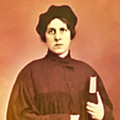References
- 1 2 3 4 Wall, Alix (8 March 2002). "Outed as a rabbi, Orthodox woman to speak here". J. The Jewish News of Northern California . Retrieved 29 October 2014.
- ↑ Horwitz, D. (2020). American Conservative Judaism and Kabbalah. In Kabbalah in America (pp. 254–265). Brill.
- 1 2 3 4 5 "Mimi Feigelson". The Shalvi/Hyman Encyclopedia of Jewish Women. Jewish Women's Archive . Retrieved 24 May 2024.
- 1 2 Fax, Julie G. (29 November 2001). "A Different Standard: Mimi Feigelson faces obstacles as an Orthodox female with smicha". Jewish Journal . Archived from the original on 30 October 2014.
- ↑ "Scholar in Residence - Reb Mimi (Miriam Sara) Feigelson" . Retrieved 29 October 2014.
- ↑ Sperber, D. (2010). On women in rabbinic leadership positions. Me'orot, 8, 2.
- 1 2 Goodstein, Laurie (21 December 2000). "Ordained As Rabbis, Women Tell Secret". The New York Times.
- 1 2 3 Cohen, Debra Nussbaum (26 June 2009). "A Woman With the Title 'Reb'". The Forward . Retrieved 24 May 2024.
- 1 2 "Meet the world's first female Orthodox rav". The Jewish Chronicle . Retrieved 26 May 2024.
- ↑ Israel-Cohen, Y. (2012). Chapter Five: Orthodox Women Rabbis?“It’s Only a Matter of Time”. In Between Feminism and Orthodox Judaism (pp. 69-78). Brill.
- 1 2 3 Fax, Julie Gruenbaum (17 September 2017). "In L.A., Reb Mimi found herself, her soul family and a way home". Jewish Journal .
- ↑ Birkner, Gabrielle (July 10, 2010). "The Sisterhood 50". The Forward .
